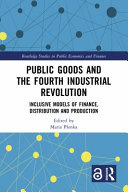(Ebook) Public Goods and the Fourth Industrial Revolution by Maria Płonka ISBN 9781032228990, 9781003274681, 9781000625370, 9781000625400, 1032228997, 1003274684, 1000625370, 1000625400
The fourth industrial revolution, characterized by digitization, artificial intelligence and augmented reality, and megatrends such as globalization, urbanization, demographic changes, and the knowledge-based economy, will trigger a series of profound technological, economic, social and environmental changes that will permanently and irreversibly change the role of the state in meeting social needs. Industry 4.0 will also change the type, nature, and scope of public goods and how they are produced, financed, delivered, and consumed. This book redefines the current paradigm of public goods. It proposes a model of production and distribution of public goods that acknowledges the participation of entities from the public, private, and nonprofit sectors. The authors argue that these entities would participate in the production, financing, distribution, and consumption of such goods. From a theoretical point of view, such an inclusive approach involving the expansion of the classical state – market dichotomy with new entities, including citizens themselves, leads to a new conceptualization and approach towards public goods. The model assumes shared responsibility, subsidiarity, and paternalistic libertarianism, and it allows the state to create new entities of an educational or fiscal nature, while remaining the regulator of public services and distribution. Additionally, the book analyzes changes regarding the perception of public goods, in the era of the fourth industrial revolution, across selected sectors such as healthcare and pension systems, education, local public goods, and public utility services. The book is primarily addressed to researchers, scholars, and students across social and technical sciences, and it will also be a useful guide for central and local administration bodies responsible for public policy. Chapters 4, 5 and 6 of this book are available for free in PDF format as Open Access from the individual product page at www.routledge.com. They have…
*Free conversion of into popular formats such as PDF, DOCX, DOC, AZW, EPUB, and MOBI after payment.


